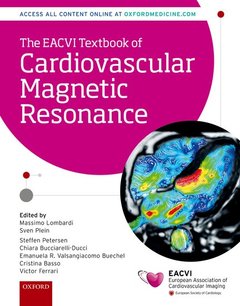Description
The EACVI Textbook of Cardiovascular Magnetic Resonance
The European Society of Cardiology Series
Author: Ferrari Victor
Coordinators: Lombardi Massimo, Plein Sven, Petersen Steffen, Bucciarelli-Ducci Chiara, Valsangiacomo Buechel Emanuela, Basso Cristina
Language: English
Subject for The EACVI Textbook of Cardiovascular Magnetic Resonance:
Publication date: 10-2018
672 p. · 22.9x28.5 cm · Hardback
672 p. · 22.9x28.5 cm · Hardback
Description
/li>Biography
/li>
This highly comprehensive and informed textbook has been prepared by the Cardiovascular Magnetic Resonance section of the European Society of Cardiology association on imaging, the EACVI. The EACVI Textbook of Cardiovascular Magnetic Resonance is the authority on the subject. The textbook is aligned with ESC Core Curriculum and EACVI Core Syllabus for CMR. It is a practical resource and provides a disease orientated outlook on the subject. Structured with thirteen clear and detailed sections, ranging from Physics to Methodology, and featuring specific sections on ischemic heart disease, myocardial disease, pericardial disease, and congenital heart disease and adult congenital heart disease, The EACVI Textbook of Cardiovascular Magnetic Resonance provides extensive knowledge across the entire subject area in CMR. Beautifully illustrated and physical principles enriched with schematic animations, the textbook is advanced further with key video content based on clinical cases. Written by leading experts in the field from across the world, the textbook aims to summarise the existing research and clinical evidence for the various CMR indications and provide an invaluable resource for cardiologists and radiologists across the board. The textbook is ideal for cardiologists and radiologists new to the field of Cardiovascular Magnetic Resonance, those preparing for ESC certification in CMR, and those established in the field wishing to gain a deep understanding of CMR. Online access to the digital version is included with purchase of the print book, with accompanying videos referenced within the text available on Oxford Medicine Online.
Massimo Lombardi started his involvement in Cardiac Imaging since his degree in 1981. He was involved in Echocardiography and namely in Myocardial perfusion and Echo Stress. In 1993 he moved to Trondheim, Norway where he started his involvement in Cardiac MR. Back to Italy he leaded in Pisa the first fully dedicated cardiac MR centre in Italy at the National Research Council/Regione Toscana G. Monasterio Foundation. Since 2013 he is leading the Multimodality Cardiac Imaging Section at I.R.C.C.S. Policlinico San Donato in Milan, Italy. Sven Plein is a British Heart Foundation Professor of Cardiovascular Imaging at the University of Leeds and Consultant Cardiologist at Leeds Teaching Hospitals NHS Trust. Prof Plein studied Medicine in Marburg/Germany and received an MD from the Phillips University in Marburg/Germany in 1995 and my PhD from the University of Leeds in 2004. Prof Pleins main research interest is cardiovascular imaging, with a focus on cardiovascular magnetic resonance (CMR). Steffen Petersen is a Professor of Cardiovascular Medicine at the William Harvey Research Institute, Queen Mary University of London and a Consultant Cardiologist and Clinical Director for Research at Barts Heart Centre. He is also the Cardiovascular Programme Director of UCLPartners Academic Medical Centre. He is Chair-elect, Cardiovascular MRI (Dec 2016-Dec 2018) of the European Society of Cardiology's (ESC) European Association of Cardiovascular Imaging (EACVI). He holds an MBCHB and MDRES equivalent from Johannes Gutenberg University Mainz, Germany, a DPHIL (OXON) from the Department of Cardiovascular Medicine, University of Oxford, an MPH from Harvard School of Public Health. He is level 3 certified for cardiovascular magnetic resonance (CMR). He has been actively involved in cardiovascular magnetic resonance since 1998 and reports over 1000 cardiac adult MRI scans each year. Taking a medical degree followed by a postgraduate degree in cardiology and then a PhD in advanced card
© 2024 LAVOISIER S.A.S.




